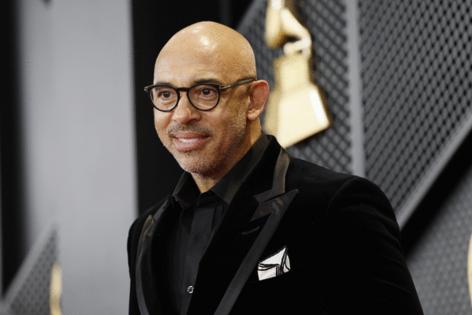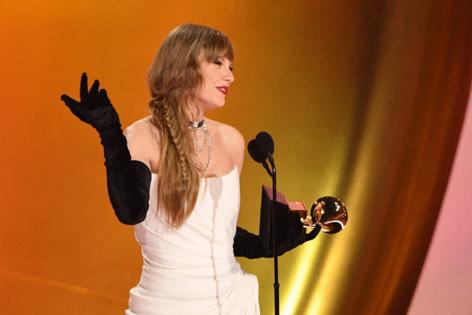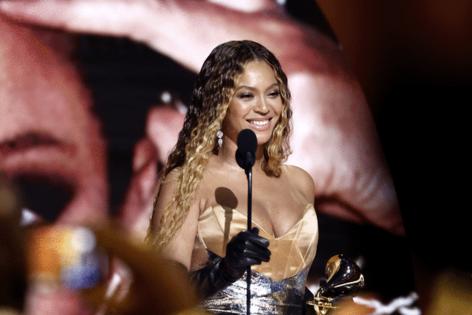Analysis: Will Grammy Awards strike right or wrong note in fire-wracked Los Angeles?
Published in Entertainment News
SAN DIEGO — The show will go on for the 2025 Grammy Awards in fire-ravaged Los Angeles, where Beyoncé, Taylor Swift and Kendrick Lamar are among the top nominees. But should it?
There are no easy answers to this question. The issues it brings up have been increasingly pondered since the Jan. 13 announcement that the 67th edition of the Grammys will take place as scheduled on Sunday, Feb. 2 — and that the telecast is being revamped to raise funds for wildfire relief efforts and pay tribute to first responders.
That is a noble goal for the Recording Academy — under whose auspices the music industry’s most diverse and prestigious annual awards fete is held — following the unimaginably horrific destruction its host city has suffered this month.
But how challenging will it be to celebrate what has long been billed as “music’s biggest night” and to honor musicians at a time when so many in Los Angeles now find themselves struggling, homeless, bereft, or some combination of all three?
And how open to celebrating will Beyoncé, Swift and the other presumed winners be, let alone the untold number of Los Angeles-area music industry professionals who suddenly find themselves unemployed because the recording studios, music venues and other places of work have been shuttered or destroyed?
The possible answers are difficult to quantify — and have stoked speculation and controversy — as multiple fires continue to burn in and near Los Angeles County, while much needed rainfall is possible this weekend.
In a Jan. 15 statement, Recording Academy CEO/President Harvey Mason Jr. acknowledged the gravity of the situation so many in and around Los Angeles are facing. The same statement announced that all but a handful of the academy’s annual Grammy week events are being canceled this year.
‘The power of music’
“We understand how devastating this past week has been on this city and its people,” said Mason, who has been a powerful agent of positive change at the academy.
“This is our home, it’s home to thousands of music professionals, and many of us have been negatively impacted. So, after thoughtful consideration and multiple assurances from state and local elected leaders, public safety agencies and with support from our incredible artist community, we have decided to go ahead with the Grammy telecast and some select events. Grammy Week 2025 will not just be about honoring music, it will be about using the power of music to help rebuild, uplift and support those in need.”
That is admirable, certainly. And the Recording Academy has — through its MusiCares charity organization — raised more than $100 million to provide assistance to musicians and other music industry workers facing financial, medical and personal hardships, including addiction recovery and disaster relief.
This year’s all-star MusiCares fundraising concert on Friday, Jan. 31, at the Los Angeles Convention Center will salute the band the Grateful Dead. It, too, is being revamped with the goal of raising even more money for fire victims.
The Recording Academy and MusiCares have thus far raised and pledged more than $2 million in emergency aid to members of the music community affected by the wildfires, following the launch of the organizations’ Los Angeles Fire Relief Effort to Support Music Professionals.
But the academy appears to be stuck between a rock and a hard place when it comes to this year’s Grammy Awards. And the decision to adapt what it calls a “condensed” schedule of 2025 Grammy week events came a day after — not before — Spotify, Billboard magazine and such major record companies as Sony, Universal, BMG and Warner Music Group all announced they were canceling their annual Grammy Week events out of deference for the victims of the wildfires.
One of the first companies to cancel its 2025 Grammy party was Milk & Honey Management, which has offices in Los Angeles; Nashville, Tennessee; New York; Dallas; London and Sydney.
“It would be tone deaf to celebrate and I hope all other companies will follow suit,” said Milk & Honey Founder/President Lucas Keller in an Instagram post.
It’s important to note that Keller was referring to Grammy parties being “tone deaf,” not the Grammy telecast itself. But the bigger issue comes down to a simple — and, apparently, complex — matter of timing.
This month has seen the announcement of the 2025 Oscars nominees pushed back several times until Thursday, while the Oscars telecast is still set to take place as scheduled — more than a month from now — on March 2. Other annual Hollywood events celebrating the film industry have been postponed “until further notice,” or canceled altogether, along with some film and TV premieres. But the Grammy Awards are not being pushed back.
Beyoncé prays ‘for healing’
On Jan. 13, Beyoncé — who this year has a field-leading 11 Grammy nominations — announced her foundation’s donation of $2.5 million to the LA Fire Relief Fund. She also postponed a major announcement that had been scheduled for the same day (most likely regarding a new concert tour in support of her groundbreaking “Cowboy Carter” album).
In a statement on social media, Beyoncé attributed her postponement to the “devastation caused by the ongoing wildfires around areas of Los Angeles. I continue to pray for healing and rebuilding for the families suffering from trauma and loss. We are so blessed to have brave first responders who continue to work tirelessly to protect the Los Angeles community.”
In an Instagram post on Jan. 16, Swift announced she had made donations to 10 fire relief organizations, including MusiCares and Habitat for Humanity.
“The fires in California have devastated so many families, and it’s been heartbreaking to see these stories unfold. So much suffering, loss, and destruction,” Swift wrote in a post on Instagram. “These are the organizations I’ve donated to. If you feel compelled or able to donate, please do.”
Also on Jan. 16, Canadian pop star the Weeknd postponed the release of his new album and canceled his planned Jan. 25 concert at the Rose Bowl in Pasadena. The stadium is now being used as a home base for temporarily housing and feeding more than 3,000 first responders that have been battling the nearby Eaton fire.
On Jan. 18, the Weeknd donated $1 million to fire relief charities. “My focus remains on supporting the recovery of these communities and aiding its incredible people as they rebuild,” he said in a statement on social media.
The Recording Academy’s focus is clearly much the same in its pivot to making next weekend’s Grammy events fundraising-driven, rather than just the usual festive celebration. But would it have been more prudent to postpone the telecast by at least a few weeks?
That is precisely what the academy has done twice before.
In 2021, the COVID pandemic led to the telecast being moved from January to March, when it was held without an audience. In 2022, a surge in COVID Omicron variant cases saw that year’s telecast postponed from Jan. 31 at Crypto.com Arena (formerly known as Staples Center) in Los Angeles to April 3 at MGM Garden Arena in Las Vegas. That was also where the 2022 edition of MusiCares, which feted Joni Mitchell, was held.
“We have a Plan (A) and a Plan B, for January,” Grammy honcho Mason said in a Union-Tribune interview in November 2021. Two months later, in January 2022, he announced that the telecast was being postponed until that April and moved to Las Vegas.
The ratings for the 2022 Grammys telecast were up 2.1% over the ratings for the 2021 telecast, which saw Beyoncé and Swift both make history with their respective wins.
The 2021 iteration was, as I noted in my review, “the first edition of the Grammys to take place without an audience, apart from the honorees who performed and applauded each other. It was also the first to be held in and around the 720,000-square-foot Los Angeles Convention Center — standing in for the adjacent Staples Center, the usual site for the 3-1/2-hour awards marathon — and the first where nearly all but a few awards were presented outdoors on one of the center’s balcony.”
Clearly, the academy knows how to pivot in trying circumstances. It did the same in 2020, when — only 10 days before the Grammys telecast — the academy weathered a firestorm of controversy over the sudden ouster of Mason’s predecessor, Deborah Dugan, amid charges of corruption, discrimination and sexual assault. Alicia Keys did a commendable job of deftly hosting the 2020 telecast, which took place the same day that Los Angeles basketball legend Kobe Bryant died in a helicopter crash.
Costly litigation ensued, although apart from receiving bad press, the fallout was felt largely within the academy, not as it is this year with the numbing loss of life, property and livelihoods across the greater Los Angeles area.
Of course, the Grammys telecast and livestream go out to a national and international viewing audience that numbers in the tens of millions, not just to Los Angeles residents. And the fact that so many Los Angelenos are in dire need, both in and outside of the music industry, bolsters the case for holding the Grammys and MusiCares to raise money to help those in need.
In any year, the telecast and MusiCares provide employment for hundreds of stagehands, audio and lighting technicians, TV production crews, managers, publicists, ushers, security guards, caterers and others who need a paycheck more than ever before. This also holds true for the employees at nearby hotels where out-of-town Grammy attendees will be staying, as well as for limo, taxi, Uber and Lyft drivers, restaurant workers, and others whose livelihoods stem in large part from tourism.
Hope and harmony
Music, at its best, can uplift and unify. It can lift spirits and provide hope and harmony in times of tragedy and need. It can simultaneously entertain, enlighten and bring attention to worthy causes. It can provide a few hours of escape, if not relief, when we are reeling from soul-sapping events.
But is it insensitive, if not tone-deaf, to hold the usually star-studded Grammy Awards so soon after the horrific fires that have displaced tens of thousands of people — fires that, as of this writing, 10 days before the Grammy telecast, are still burning?
What tone will returning host Trevor Noah, who was only announced Tuesday and is himself a best comedy album nominee this year, strike?
How will the performers — none of whom were announced before the midday Thursday deadline for this article — strike a tone that is suitably sensitive and serious at an event that is typically upbeat and glitzy?
How many attendees from other cities and states will feel comfortable if claiming the hotel rooms they reserved means the ouster of displaced Los Angeles residents, who are unable to return to their homes, or have no homes to return to?
It is also unclear whether the delay in announcing any performers so close to the telecast suggests a reluctance to appear on the part of Swift and Beyoncé, this year’s two most prominent nominees, or any other top contenders. The absence of these two megastars — who for the first time since 2010 are vying against each other for the album of the year award — could impact viewership.
Nearly every question posed leads to more questions. None of them are easily answered.
The bottom line, then, may be whether the credibility of the Grammy Awards and its ability to raise money for fire victims is helped, or hindered, by going ahead as scheduled on Feb. 2. Here’s hoping it’s the former.
———
THE 67TH ANNUAL GRAMMY AWARDS
Hosted by: Trevor Noah
Featuring performances by: No performers were announced prior to the midday Thursday deadline for this article.
When: 5 p.m. PT Sunday, Feb. 2 on CBS, Paramount+ and Showtime.
2025 GRAMMY AWARDS PREMIERE CEREMONY
Featuring: No performers or hosts were announced prior to the midday Thursday deadline for this article.
When: 12:30 p.m. Sunday, Feb. 2. on grammy.com and the Grammy YouTube channel.
———
©2025 The San Diego Union-Tribune. Visit sandiegouniontribune.com. Distributed by Tribune Content Agency, LLC.


















Comments